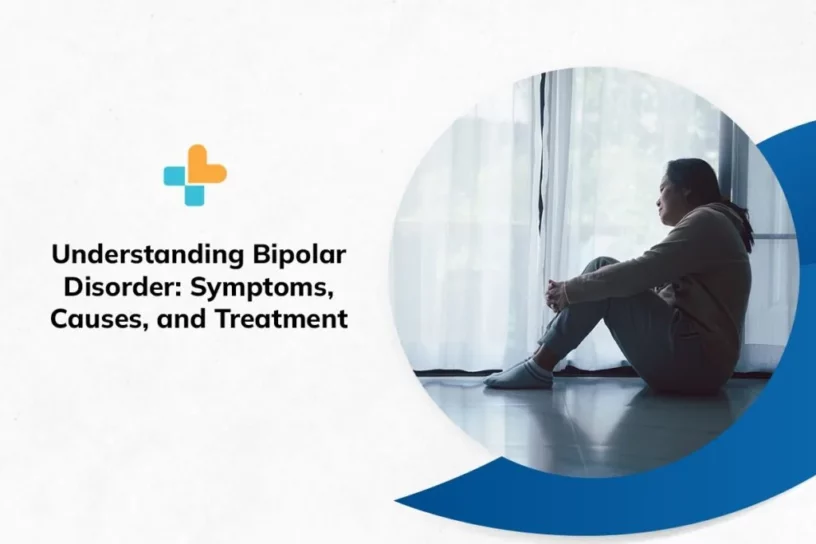In India, bipolar disorder disease affects one in 150 people; despite being curable, 70% of cases go untreated.
Bipolar disorder is a mental illness or personality disorder characterized by extreme mood swings, which can range from euphoric highs to deep lows. Emotional highs are represented through mania or hypomania, while lows are represented by depression.
Whether you are suffering from bipolar disorder or looking to learn more about it to help a loved one, this blog will be a beneficial resource for obtaining a better understanding of this personality disorder.
Symptoms and Causes of Bipolar Disorder: A Quick Overview
The symptoms of bipolar disorder can vary from person to person but can be classified into two broad categories: mania and depression.
Mania or Hypomania
During manic or hypomanic episodes, individuals with bipolar disorder may feel extremely happy, energetic, and euphoric and may have a decreased need for sleep.
Mania can be characterized by the following symptoms:
- Elevated or irritable mood
- Increased energy and decreased need for sleep
- Impulsive or reckless behaviour
- Rapid speech
- Grandiose delusions
- Agitation or irritability
Depressive Episodes
Depressive episodes are characterized by persistent sadness, hopelessness, and loss of interest in activities.
Individuals with bipolar disorder may experience the following symptoms during a depressive episode:
- Persistent sadness or hopelessness
- Loss of interest or pleasure
- Changes in appetite or sleep patterns
- Fatigue or loss of energy
- Feelings of guilt or worthlessness
- Difficulty concentrating
- Thoughts of death or suicide
Causes of Bipolar Disorder
Although the precise cause of bipolar disorder is unknown, research has found several possible root causes.
1. Abnormal Brain Structure and Functioning
Several studies have found that differences in brain structure and neurotransmitter levels may play a role in the development of bipolar disorder. It could also be caused by chemical imbalances in the brain.
2. Family History
According to numerous studies of people with bipolar disorder and their relatives, the disorder can occasionally run in families.
That said, there isn’t one single gene responsible for bipolar disorder.
3. Substance Abuse
People with bipolar disorder may experience episodes of mania or depression, which may be brought on by excessive alcohol use or made worse by drug abuse. This could even make it difficult to distinguish between the effects of alcohol and drugs and the symptoms of mental illness.
4. Stressful Life Events
Traumatic life events can also play a role in the development of this mental illness. Studies show that childhood trauma could negatively affect one’s ability to cope with stressors, thereby increasing their chances of developing bipolar disorder.
5. Medications
Some medications have the potential to cause hypomania or mania as a side effect, so it’s important to rule out other causes before making a diagnosis.
6. Hormonal Changes
Some people with bipolar disorder may experience mood changes and episodes of mania or depression as a result of hormonal changes during puberty, menopause, or pregnancy.
Bipolar Disorder Treatment Options
Manic or depressive episodes in people with bipolar disorder can last for several weeks or months.
The length of the episodes can vary from person to person depending on the type of bipolar disorder, the severity of symptoms, and the availability of treatment.
Treatment for bipolar disorder typically involves a combination of medication and psychotherapy.
1. Medications
In order to prevent bipolar symptoms, doctors may prescribe mood-stabilizing medications, such as lithium, valproic acid, or lamotrigine. They may also prescribe antidepressants and antipsychotics after further diagnosis.
2. Psychotherapy
Cognitive behavioral therapy (CBT), interpersonal and social rhythm therapy (IPSRT), and family-focused therapy are among the most effective forms of psychotherapy for bipolar disorder.
3. Electroconvulsive Therapy (ECT)
In case the patient has not responded to other treatments, ECT (electroconvulsive therapy) may be used. It is usually used as a last resort.
A brief electrical stimulation of the brain is applied while the patient is under general anesthesia. This can help to regulate the activity of certain brain chemicals, leading to improvement in mood and symptom reduction.
How To Find the Best Resources for Bipolar Disorder
The best treatment plan will depend on an individual’s specific symptoms and needs. A mental health professional can work with the person to develop a customized treatment plan.
At Ayu Health, we’re committed to providing the latest information and resources to help individuals affected by mental health conditions, including bipolar disorder.
If you need additional resources or would like to speak with a professional, feel free to contact us right away at +91 636-610-0800 or book an appointment on our website. Our expert team is here to assist and support you every step of the way.
Our Hospital Locations
General Surgery Hospitals in Chandigarh | General Surgery Hospitals in Bangalore | General Surgery Hospitals in Jaipur | General Surgery Hospitals in NCR | General Surgery Hospitals in Hyderabad
Our Doctors
General Surgery Doctors in Chandigarh | General Surgery Doctors in Bangalore | General Surgery Doctors in Jaipur | General Surgery Doctors in NCR | General Surgery Doctors in Hyderabad
About the Author

Dr. S. Goel
Dr. S. Goel is a renowned Internal Medicine Specialist currently practicing at Ayu Health, Bangalore. He is a Specialist in Internal Medicine, Diabetes HTN, Paediatric Care, and Family Medicine.




